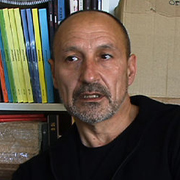 |
| Martí Peran |
Is it possible to produce an art exhibition that reflects the feeling of fatigue that contemporary life causes on individuals? How would that be possible? And why do it if its realization would be another causing act of fatigue? These questions will be explored at the conference “How to Convert Fatigue in an Art Exhibition?”, that art theorist Martí Peran, a professor at Universidad de Barcelona, will give on September 8 at 3 pm.
The event has been organized by IEA-USP’s Forum Permanente: Cultural System between Public and Private Research Group and will be held in Ruy Leme Room at USP’s Faculty of Economics, Administration and Accounting (FEA).
SELF-PRODUCTION OF IDENTITY
In the opinion of Peran, if industrial capitalism used to produce commodities with exchange value and the post-Fordist capitalism has shifted to the production of subjectivity, the gain today focuses on self-production of identity: "The logic of the subject of self-exploration has been imposed. The rhetoric of entrepreneurship and ideological advertising is unequivocal: 'Do it yourself', 'I am what I am.'"
From this ideas, Peran identifies the existence of a new productive motto, the "make thyself", causing a widespread nervous hyperactivity, once the individual is required to make small but constant and endless decisions in all spheres of his life (professionally, emotionally, socially, etc.), which have become the new force at work: "They do not contain anything and ensure the benefit generated by the constant action of the ‘restlessness’. The individual has been confused by the incessant movement of their own alienation."
To Peran, this hyperactivity is a paradigm of "poverty of experience" since it leads to a deficit surplus, because the individual has many experiences but almost all of them are banal. He remembers that the consequence of this has been recognized in the statements of several authors: bare life (Giorgio Agamben), damaged life (S. López Pequeño), tiredness society (Byung-Chul Han), corrosion of character (Richard Sennett), factory of unhappiness (Franco Berardi) and depressive society (Alain Ehrenberg).
PRAISE OF FATIGUE
This self-exploration makes the pain of fatigue inevitable. However, according to the speaker, instead of representing a pathological condition that must be corrected in order to return to the senseless spiral of production, fatigue may represent an opportunity for the awakening of consciousness, the inflection point from which a process of emancipation begins. "Fatigue is the point of arrest and break, the moment of 'capable tiredness’, in the words of Peter Handke, with which sabotage begins. Fatigue thus becomes - as the molecular revolution - the beginning of a gap that politicizes the malaise.”
While for engineers fatigue refers to the resistance decrease of materials subjected to repetitive stress, in the sphere of social engineering, Peran defines it through a phrase from Roland Barthes: "The claim of the individual exhausted body that claims the right to social rest."
With fatigue, explains Peran, hyperactivity merely changes in production of detention, and there lies the emancipatory principle of miseducation while its neutrality rests on the still promise of all the possible diversity. He believes that this praise of fatigue (similar to apologies of laziness, anonymity, disappearance and inaction) occupies a similar position - "perhaps inverted" – to the one previously occupied by melancholy in the contemporary experience.
Peran, who is also an art critic and curator asks how to convert this argument into an art exhibition, how to articulate a situation to transfer these contents, and take this to the limit by asking if "these little challenges, characteristic of a increasingly depleted disciplinary field lead to the question: why organize an exhibition"?
PROFILE
Professor of art theory at the Universidad de Barcelona, Peran is the director of the Roundabout Encounter Program, which promotes exchanges between Barcelona and other world cities such as Bangkok, Jerusalem, Istanbul and Santiago. He also contributes to several books and catalogs on contemporary art, writing regularly for newspapers and magazines, both printed and electronic, such as BBC and Exitexpres.
He joined the editorial board of "Transversal - Journal of Contemporary Culture" (1996-2002) and was co-editor of "Gypsy". His most recent projects as a curator include: "Post-it city Occasional Cities." (CCCB, Barcelona, 2008; MAC, Santiago de Chile, Centro Cultural São Paulo, 2009); "After Architecture" (Arts Santa Monica, Barcelona, 2009); "Glaskultur. ¿Qué pasó con la transparence " (Koldo Mitxelena, San Sebastián, 2006).
The event will be broadcast live on the web.